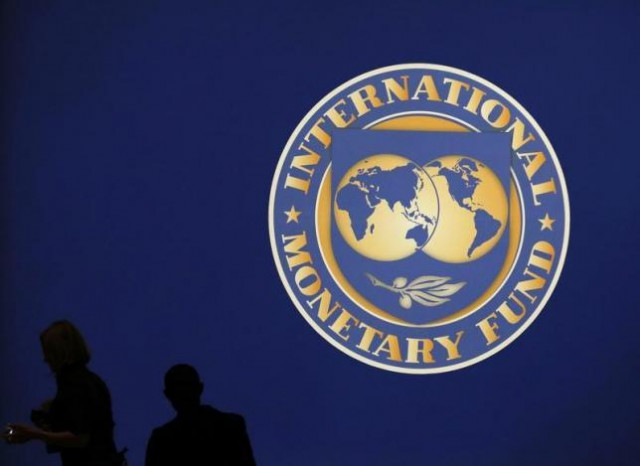Risks to Pakistan's economic outlook have increased: IMF
Says country’s ‘medium-term’ debt repayment capacity has also weakened

Says country’s ‘medium-term’ debt repayment capacity has also weakened. PHOTO: REUTERS
The IMF released the statement almost one and a half day after the conclusion of its Executive Board meeting that held the ‘first post-program monitoring discussions’ with Pakistan. The discussions were earlier also held in Islamabad in December to gauge Pakistan’s ability to repay the IMF loan.
The IMF’s projections over the current account and budget deficits are gloomy to say the least, and cast a huge question mark on the narrative presented by former finance minister Ishaq Dar at the time of unveiling the government’s fifth budget in June last year. The IMF has projected that the country’s current account deficit will stand at 4.8% of total national income, or $16.6 billion, which is a staggering 83% higher than the government’s official estimates.
Sheer size of CPEC portfolio appals IMF
The IMF has also predicted that Pakistan’s official gross foreign currency reserves could slip to $12.1 billion – barely enough to finance 10 weeks of imports.
The directors of the IMF also asked Pakistan to improve its anti-money laundering and counter-terrorism financing regimes. They also want the country’s managers to devalue the currency to minimise damages to the external sector, and levy more taxes to control the growing budget deficit.
With “rising external and fiscal financing needs and declining reserves, risks to Pakistan’s medium-term capacity to repay the Fund have increased since completion of the Extended Fund Facility (EFF) arrangement in September 2016”, noted the IMF in its handout released Wednesday morning.
It said Pakistan’s near-term outlook for economic growth is broadly favourable and real GDP growth is expected to grow by 5.6% in fiscal year 2017-18, supported by improved power supply, investment related to the China-Pakistan Economic Corridor (CPEC), strong consumption growth, and ongoing recovery in agriculture. Inflation has remained contained.
However, it added, continued erosion of macroeconomic resilience could put this outlook at risk.
The budget deficit is expected to widen to 5.5% of GDP this year, which is equal to almost Rs2 trillion and will be the highest in Pakistan’s history in absolute terms. The official target is 4.1% of the GDP or Rs1.48 trillion.
The IMF said that the deficit may even go higher due to upcoming general elections.
The Washington-based lender also said that surging imports have led to a widening current account deficit and a significant decline in international reserves despite higher external financing. FY 2017/18’s current account deficit could reach 4.8% of GDP, with gross international reserves further declining in the context of limited exchange rate flexibility. This is equal to $16.6 billion – and far higher than $12.1 billion deficit that Pakistan has booked last fiscal year.
Growth in Pakistan expected to pick up in 2018, 2019: IMF
The IMF directors “noted with concern the weakening of the macroeconomic situation, including a widening of external and fiscal imbalances, a decline in foreign exchange reserves, and increased risks to Pakistan’s economic and financial outlook and its medium term debt sustainability”.
Pakistan’s external debt and liabilities have already increased to $89 billion by the end of December and the figure is expected to significantly jump by the time the current fiscal year ends due to mounting external repayment and trade related obligations. The IMF sees no change in the country’s debt burden and said that the overall debt-to-GDP ratio would remain at 69.7% – even higher than the limit set by parliament for the government.
The directors welcomed the authorities’ move to allow some exchange rate adjustment last December, but “stressed the importance of greater exchange rate flexibility on a more permanent basis to preserve external buffers and improve competitiveness”.
The IMF also encouraged Pakistan to phase out administrative restrictions that it has placed on imports to contain its bill.
It noted that external sector pressures are in part linked to the fiscal deterioration during last year and an accommodative monetary policy stance, as well as the high imports related to CPEC projects.
They called on the authorities to strengthen fiscal discipline through additional revenue measures and efforts to contain current expenditure while protecting pro poor spending. Complementing the recent increase in the policy interest rate with further monetary tightening would be important to address inflationary risks and help reverse external imbalances.
Rupee’s fall set to change economic landscape
The IMF directors also emphasised the need for prudent debt management and caution in phasing in new external liabilities, and the urgency of tackling rising fiscal risks stemming from continued losses in public sector enterprises.
“There is absence of political consensus in Pakistan, which remains an obstacle to deep structural reforms,” said Tokhir Mirzoev, the outgoing resident representative of the IMF. He said that politics must be separated from the country’s economic agenda.
“The economic future of Pakistan is the collective responsibility of all political parties, whether they are in the government or in the opposition,” said Mirzoev, who ends his three-year term in Pakistan this week.



















COMMENTS
Comments are moderated and generally will be posted if they are on-topic and not abusive.
For more information, please see our Comments FAQ